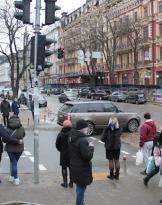Homs is the city of the clock.
After standing still for a long time, almost not wanting to mark the time of war, from 10 May 2015, at 12 o'clock he resumed his incessant work.
He is there, high up, and he has seen many things, even if in silence for a while.
He saw the protests, the clashes, the fury of war ... Now he is witnessing the population's attempt to return to normal.
The old city of Homs, we are not afraid to say it at the cost of appearing cynical, it is fascinating and suggestive ... .Evoca post-apocalyptic scenarios, refers to an image of the earth 1000 years after the extinction of mankind ...
Here is perhaps this is the point; Homs is a kind of warning, he suggests, whispering through the deserted streets of the old city where the rustle of the wind is the master, that the horror is always around the corner and that our certainties are as fragile as the walls of his homes.
Some buildings appear as Esher's paintings with stairwells leading nowhere, while others appear literally dissolved.
The shutters of the shops, those that have not been torn apart by explosions, are curled up like foil, the souq is deserted and the clamor of shopkeepers and customers is replaced by the beating of rusty sheets in the wind.
 However in all this desolation it is not infrequent to cross travelers, people busy in the alleys of the old city, intent to remove rubble or to rebuild their home or their business. Among these is Ammar.
However in all this desolation it is not infrequent to cross travelers, people busy in the alleys of the old city, intent to remove rubble or to rebuild their home or their business. Among these is Ammar.
He had a good job, a car and a large multi-story house where he lived with his whole family (parents and siblings).
Everything changed almost five years ago when two cars arrived with eight armed men on board, unknown people who sported menacing firearms: they threw a corpse in the street with obvious signs of torture.
"Police and army never showed weapons in public", he points out.
Then the warning: "The infidels will do the same!"
Some time later it will be up to eight women. The fault for most of them was that they were Christians. Completely stripped and beaten under his house, made to walk to a square, they are murdered. Some were pregnant. The YouTube video of "moderate rebels" playing soccer with newly extracted fetuses from the still warm wombs of mothers will run for months before being removed.
To protect the population in the street where the shop was working as a baker, the army sends a BMP (combat vehicle). Terrorists blow it up (photo).

The desired effect is achieved: the inhabitants flee terrorized.
Ammar among them.
"It was six in the morning of 14 March 2012," he remembers.
Today he lives close to his home. Before, in five years, he moved five times. He paid a low rent because he rebuilt the damaged apartment he occupied with his family: his father, his wife and two children.
The apartment is like that of millions of its countrymen: Spartan, poor but dignified.
The wife brings us some tea that her father went to buy just for the occasion.
"I had everything. Now I live in rent amid uncertainty. But I must go on, for my children ".
It survives occasional and badly paid jobs. He also worked as a worker for a United Nations agency. When he was absent for ten days, to be near a seriously ill one year old daughter, he would be fired.
He dreams of rebuilding the house in which he lived. The oven in which he worked is irreparably destroyed.
Ever thought of fleeing abroad?
Never. It's our country, where should I go?
I have a lot of work in front of me, I have to rebuild my life.
Unfortunately for us it has become normal to live in the midst of this destruction.
It's also hard not to know what happened to so many friends or acquaintances ...
Ammar stares at us for a few seconds with a strange look and takes yet another puff of a cigarette.
Do not you ask me all the foreign journalists I meet?
What?
The one on the different religions in Syria! You all believe that the ongoing conflict has been and is due to belief.
Confession has never been a problem in my country! Indeed, it was socially reprehensible to speak of it in discriminatory terms. Before the war ...

Text: Andrea Cucco, Giorgio Bianchi
Photo: Giorgio Bianchi












